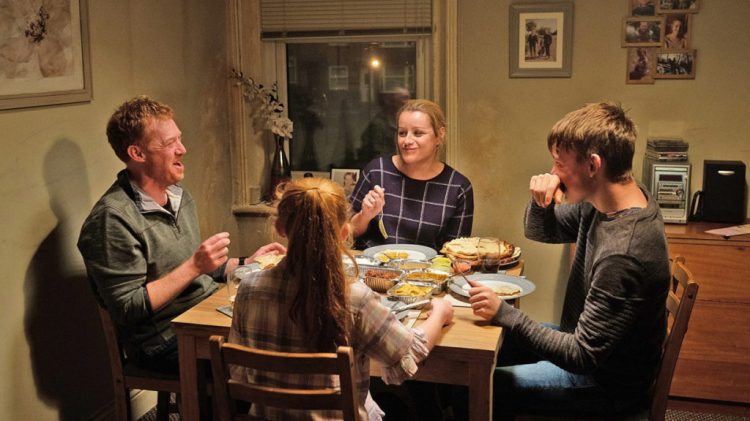The rap on Ken Loach is a lack of subtlety. I could expend a hundred words parsing how the OED defines ‘subtlety,’ but suffice it to say that when films are as transparent — crystalline — as Loach’s and still reward several watches, the quibbling looks silly. In Sorry We Missed You, the British chronicler of proletarian despair dissects the dehumanizing effect of delivery services. Unlike much of his work (Poor Cow, Ladybird, Ladybird, the Cannes hit The Wind That Shakes the Barley), only some of which has gotten American distribution, Sorry We Missed You has a tonal range that will assure detractors right up to its devastating conclusion.
Unable to find financial footing since the 2008 meltdown, Ricky Turner (Kris Hitchen) turns to an unnamed company, proffering himself as He’s not an employee, his new boss Gavin (a frightening Ross Brewster) insists. This tliver those most valuable items called “precisors.”None of this sits too well with wife Abbie (Debbie Honeywood). A home care nurse, she needs her car. But when Ricky sells it to buy his van, he yields. Sohick, stocky man with a blond head like a battering ram recites the new corporate patter as if he’s been reciting it since first grade. “You don’t work for us,” he says. “You work with us.” There’s no “clocking out” — you “become available. He’s not “hired” — he’s “on-boarded,” and so on. Talk to any Uber or Lyft driver and the same blather about “choice” and “flexibility” comes up. Above all, Gavin tells Ricky, he must appease the hand-held scanner: how quickly Ricky can dea driver.on he develops a rhythm of sorts, quickly becoming one of Gavin’s dependable drivers; he doesn’t even have to stop to pee, for a colleague advises him to keep a plastic bottle handy. Working fourteen days straight is not unusual (so much for “you don’t work for us”). But the job’s crushing demands keep him from noticing the unraveling of his family: eleven-year old Lisa Jane (Katie Proctor) watches as her teen-aged Seb (Rhys Stone) flirts with gangsterism (the racial politics of this plot thread don’t get enough scrutiny).
Because this is a Ken Loach film, the audience waits for the moment in Sorry We Missed You when these strands connect for the sake of a devastating conclusion. As with I, Daniel Blake (2016), though, this film is a continuous exercise in raw nerve rubbing. I’ve lamented for years the dearth of films about work: how people deal with a segment of their lives that before the smart phone and the fiber optic cable was autonomous. Loach and longtime scriptwriter Paul Laverty dismiss binaries: Sorry We Missed You is didactic and complex; the Turners are stick figures and fully inhabited creations. Thanks to Proctor, a non-actor, Lisa Jane acts as the film’s conscience: powerless to stop their slide, willing to try anyway. These people keep surprising us. A director less attuned to the ways in which family politics exist in constant vacillation wouldn’t have included a scene in which Ricky, trying to save a potentially ruined evening of Indian takeaway when a client in desperate straits calls Lisa Jane for help, suggests they all hop in the van to leave her. On the way they sing “Shaft” and other songs from Ricky and Lisa Jane’s hungry youth — they met at a rave in the late nineties, we learn.
Released in 2019 but just now finding its way on streaming services, Sorry We Missed You could not seem more contemporary. At the peak of quarantine, we depended on delivery services for books, masks, and ephemera. We’re all in “this” together, Loach argues, but we’re all also under indictment.
GRADE A-


Agreed; this film is arguably even more current now that we are delivery dependent…
Another incisive portrait of the Life Down Here from the lens of Ken Loach. I’ve heard he shoots his films in sequence so that his largely untrained casts experience the story in sequence for sustained effect. His canon of films should be preserved in time capsules to show how the forgotten people lived in their time. Maybe then there won’t be any more forgotten people.
Well put. What are your favorites?
Only seen a handful (6), but the last two and “Kes” stick with me the most. I can’t believe I still haven’t seen “The Wind That Shakes The Barley.”